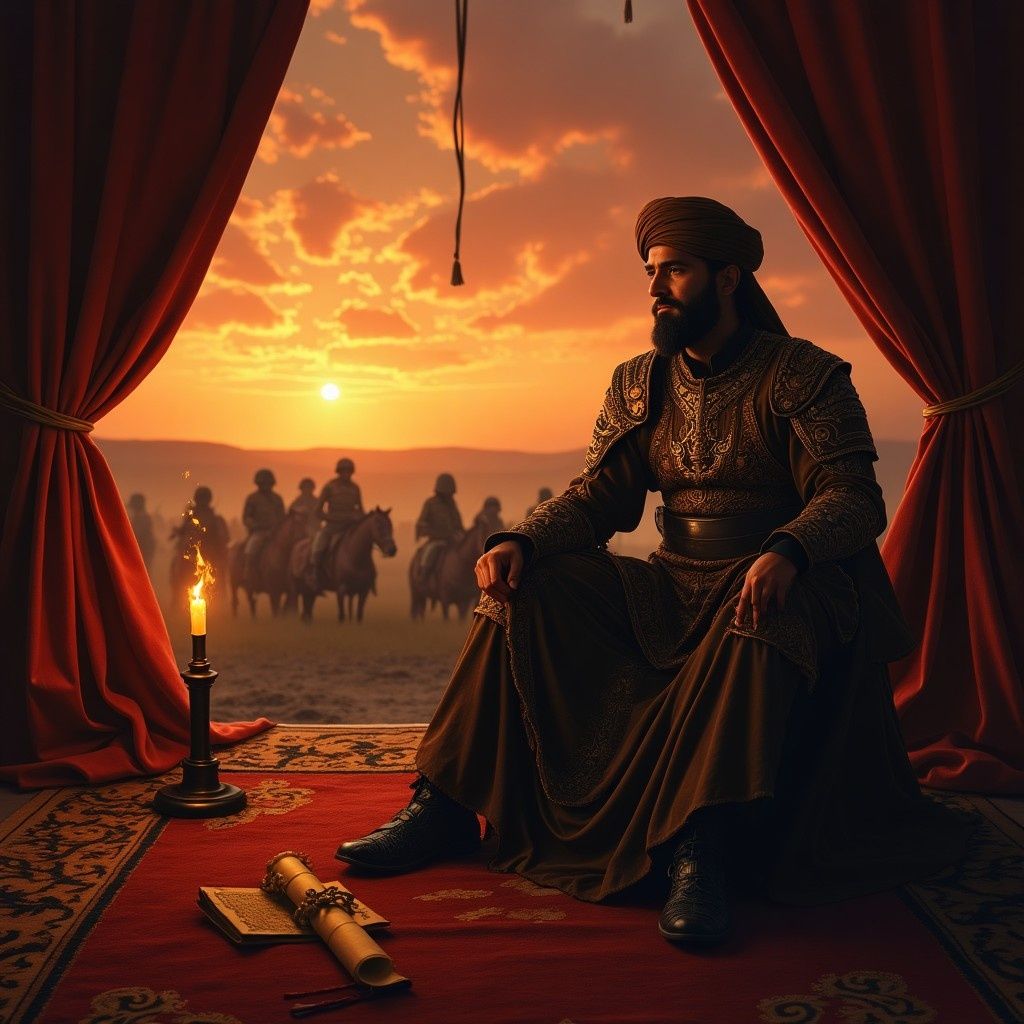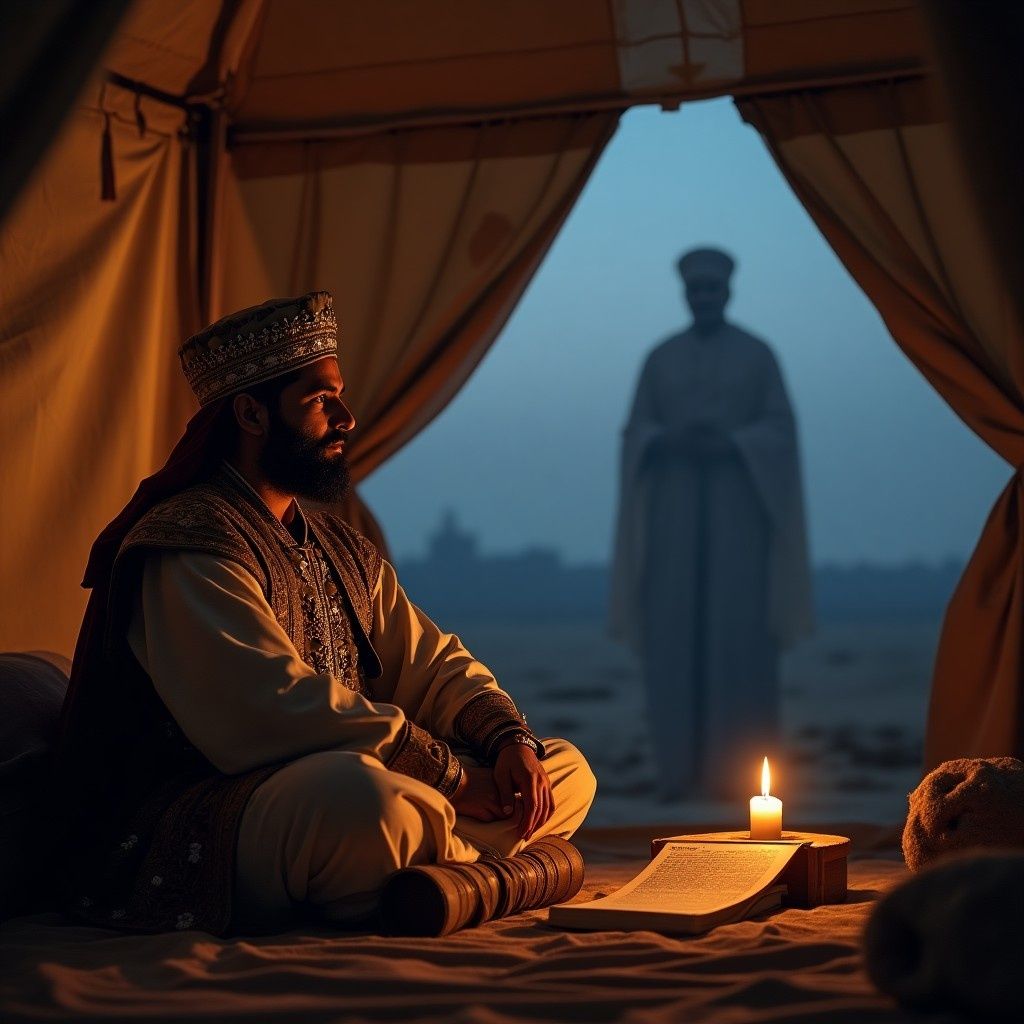The sun dipped low over the dusty plains of Panipat, casting long shadows across the battlefield where the fate of empires was decided.

The air was thick with the acrid scent of gunpowder and the cries of wounded men. Amidst this chaos, Ahmad Shah Durrani, the indomitable founder of the Durrani Empire, surveyed the field with a gaze as steely as the armor he wore. Durrani's heart beat with the rhythm of conquest, each thud a reminder of his mission to expand his dominion over the Indian subcontinent. Yet, as he stood on the precipice of victory against the Marathas, a flicker of doubt crept into his mind. This was his third invasion, and while he had tasted the sweetness of triumph, he had also felt the bitterness of resistance. Nearby, his trusted advisor, Wazir Khan, approached with news. "Sire, the Marathas are retreating. The field is ours." Durrani nodded, his eyes scanning the horizon. "And the Sikhs?" he asked, his voice carrying the weight of past encounters. Wazir Khan hesitated, a shadow crossing his face. "They gather strength, my lord. Their resistance grows bolder with each passing day." The mention of the Sikhs stirred something within Durrani—a mix of respect and frustration. Their defiance was a thorn in his side, yet he could not help but admire their tenacity. Each skirmish with them was a reminder that his path to supremacy was fraught with challenges. As the day waned, Durrani retreated to his tent, the canvas walls flapping gently in the evening breeze. He sat alone, the weight of his ambitions pressing heavily upon him. His thoughts drifted to his homeland, to the people who depended on his strength and vision.

The lure of wealth and power was undeniable, yet the cost of endless war gnawed at his conscience. In the flickering candlelight, Durrani's mind wandered to a memory—a conversation with his father, long before he became a conqueror. "Strength is not in the sword, Ahmad," his father had said, "but in the wisdom to know when to wield it." The memory lingered, a ghostly whisper in the quiet of the night. Durrani knew he was more than a warrior; he was a leader, a builder of empires. But what kind of legacy would he leave behind?

As dawn broke, painting the sky in hues of orange and gold, Durrani emerged from his tent, a renewed resolve in his heart. He would continue his campaign, but with a tempered approach. He would seek alliances, not just victories. He would wield his power with wisdom, not just force. The Third Battle of Panipat had been won, but the true battle lay ahead—in the hearts and minds of those he sought to rule. Durrani mounted his horse, his eyes fixed on the horizon, where the future of his empire awaited. In the distance, the sound of drums echoed—a reminder of the challenges yet to come. But Ahmad Shah Durrani was ready. He was not just a conqueror; he was a visionary, and his story was far from over.

The air was thick with the acrid scent of gunpowder and the cries of wounded men. Amidst this chaos, Ahmad Shah Durrani, the indomitable founder of the Durrani Empire, surveyed the field with a gaze as steely as the armor he wore. Durrani's heart beat with the rhythm of conquest, each thud a reminder of his mission to expand his dominion over the Indian subcontinent. Yet, as he stood on the precipice of victory against the Marathas, a flicker of doubt crept into his mind. This was his third invasion, and while he had tasted the sweetness of triumph, he had also felt the bitterness of resistance. Nearby, his trusted advisor, Wazir Khan, approached with news. "Sire, the Marathas are retreating. The field is ours." Durrani nodded, his eyes scanning the horizon. "And the Sikhs?" he asked, his voice carrying the weight of past encounters. Wazir Khan hesitated, a shadow crossing his face. "They gather strength, my lord. Their resistance grows bolder with each passing day." The mention of the Sikhs stirred something within Durrani—a mix of respect and frustration. Their defiance was a thorn in his side, yet he could not help but admire their tenacity. Each skirmish with them was a reminder that his path to supremacy was fraught with challenges. As the day waned, Durrani retreated to his tent, the canvas walls flapping gently in the evening breeze. He sat alone, the weight of his ambitions pressing heavily upon him. His thoughts drifted to his homeland, to the people who depended on his strength and vision.

The lure of wealth and power was undeniable, yet the cost of endless war gnawed at his conscience. In the flickering candlelight, Durrani's mind wandered to a memory—a conversation with his father, long before he became a conqueror. "Strength is not in the sword, Ahmad," his father had said, "but in the wisdom to know when to wield it." The memory lingered, a ghostly whisper in the quiet of the night. Durrani knew he was more than a warrior; he was a leader, a builder of empires. But what kind of legacy would he leave behind?

As dawn broke, painting the sky in hues of orange and gold, Durrani emerged from his tent, a renewed resolve in his heart. He would continue his campaign, but with a tempered approach. He would seek alliances, not just victories. He would wield his power with wisdom, not just force. The Third Battle of Panipat had been won, but the true battle lay ahead—in the hearts and minds of those he sought to rule. Durrani mounted his horse, his eyes fixed on the horizon, where the future of his empire awaited. In the distance, the sound of drums echoed—a reminder of the challenges yet to come. But Ahmad Shah Durrani was ready. He was not just a conqueror; he was a visionary, and his story was far from over.
Ahmad Shah Durrani, the founder of the Durrani Empire, invaded the Indian subcontinent eight times between 1748 and 1767, exploiting the political vacuum left by the declining Mughal Empire. His invasions aimed to plunder wealth and establish political dominance, significantly impacting the region's socio-political landscape. Key events include the Third Battle of Panipat in 1761, where Durrani defeated the Marathas, and his repeated conflicts with the Sikhs, who ultimately resisted and pushed back his forces. Durrani's invasions intensified regional instability, contributing to the eventual rise of the Sikh Empire and altering the power dynamics in North India.


Comments
Post a Comment